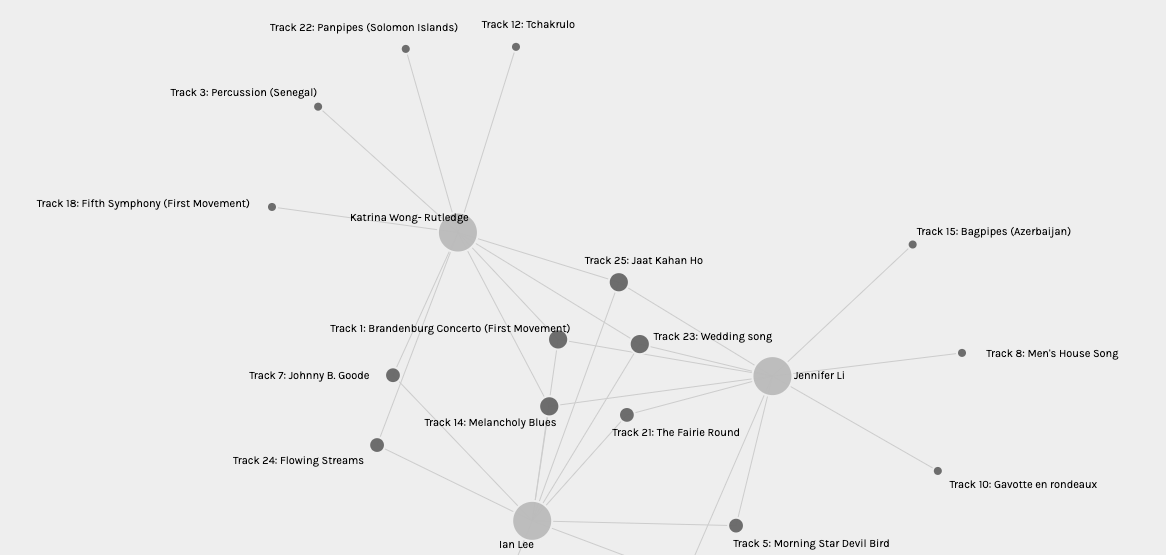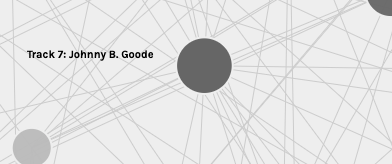
This is my first time using Palladio, so much of this was very new to me. I was grouped with Katrina W. and Ian L. with having 5 songs in common (Brandenburg Concerto [First Movement], Wedding song, Melancholy Blues, Jaat Kahan Ho, and The Fairie Round). I looked at their posts for last week’s task and I could see that diversity was something we all had on our minds when selecting tracks. Ian took it one step further to carefully curate tracks that demonstrated a range and variety of human voices to echo the message of a “repeated call-and-reply to represent our desire for communication” (Lee). Katrina wonderfully summarizes what I found to be of importance during our curation process, and that was that we put together ten songs that showed “what we value as being human” (Wong).

However, I don’t think the three of us were the only students in this course that wanted diversity in their curated record. I’ve perused quite a few blogs, and many did mention that they wanted songs that were representative of the many cultures on Earth. Palladio grouped us based on the strength of our choices, but it doesn’t do a good job predicting our intentions. Even though Ian and Katrina and I have these songs in common, it also doesn’t mean that our criteria were entirely the same, nor does it mean that I didn’t have similar criteria to another classmate that I wasn’t grouped with. Furthermore, I felt like I was “left out” of a lot of possible groups because of songs I didn’t pick (e.g., Johnny B. Goode, where there was a high number of connections). Would one track drastically change my web of connections? Is that all it would take?

When thinking about algorithms, I remember the simple definition I learned from a coding workshops I took: a set of specific instructions to get from one point to another. When it comes to searching on the internet, in the video “The Internet: How Search Works,” John of Google and Akshaya of Bing explain how ranking algorithms (such as page rank) are used to determine what results are retrieved from the search index (Code.org). In a broader sense, the term algorithm is tossed around a lot on Instagram. I follow a variety of users, from small businesses, foodie blogs, and artists, all who wish to beat the “Instagram algorithm.” There are specific ways to get more exposure for their posts; ways to appear on the top of the “explore” page, and be one of the first results found when certain terms or tags are searched. On Instagram, bookmarking into saved folders and sharing via direct messages help push posts more effectively than leaving a comment or simply liking. Rachel Reichenbach goes into detail on other ways to boost your Instagram engagement such as regularly using features like reels and stories (Rainylune). In short, more nodes and edges are rewarded to users who follow a specific set of rules.
There is a reason for going on this Instagram tangent. What is interesting to me is the way social media exploits algorithms to try and show you what you want (and makes assumptions about what matters to you). My Instagram explore is so sensitive to what I talk about in my DMs, that the moment my friend shares a post about slugs (ugh) as a joke, right away there will be a few slug posts in my explore. The algorithm doesn’t recognize personal feelings but it does identify posts shared and keywords as nodes for my account to make connections to. When looking at the Palladio graph, these visualizations of our quiz data seem to be very simple compared to how Google search was explained in that video. If we were to do a group project in the class related to the Golden Record, I’m not sure using these quiz results groupings would have a bigger impact than just choosing our own groups instead.
References
Code.org. (2017, June 13). The Internet: How Search Works. Retrieved from https://www.youtube.com/watch?v=LVV_93mBfSU&t=1s
Lee, I. (2021, March 7). Task 8: Golden Record Curation. ETEC540 – Ian Lee. https://blogs.ubc.ca/etec540ianlee/2021/03/07/task-8-golden-record-curation/
Reichenbach, R. (2020, December 20). Why your Instagram Engagement Kinda Sucks Right Now. Rainylune. https://rainylune.com/blogs/blog/why-your-instagram-engagement-kinda-sucks-right-now
Wong, K. (n.d.). Task 8: Golden Record Curation. Kat Wong. https://blogs.ubc.ca/katrinawong/task-8-golden-record-curation/